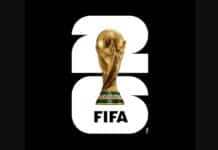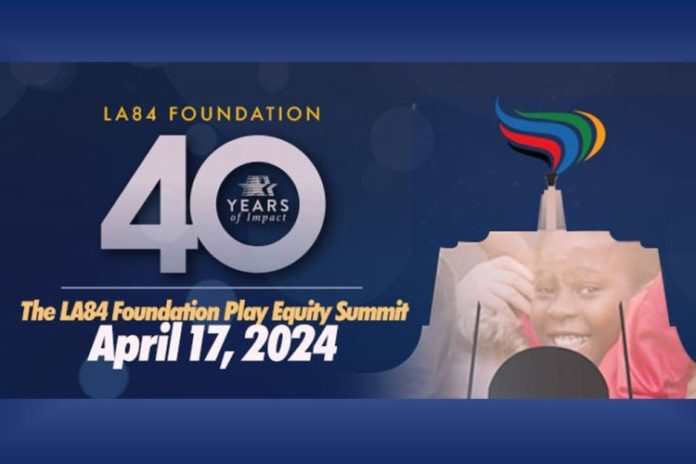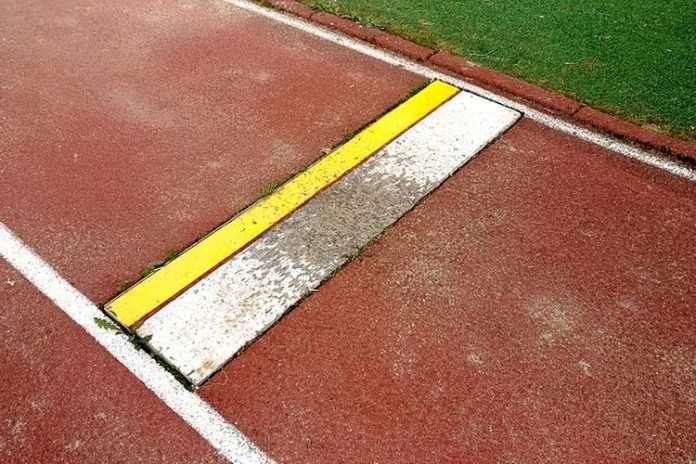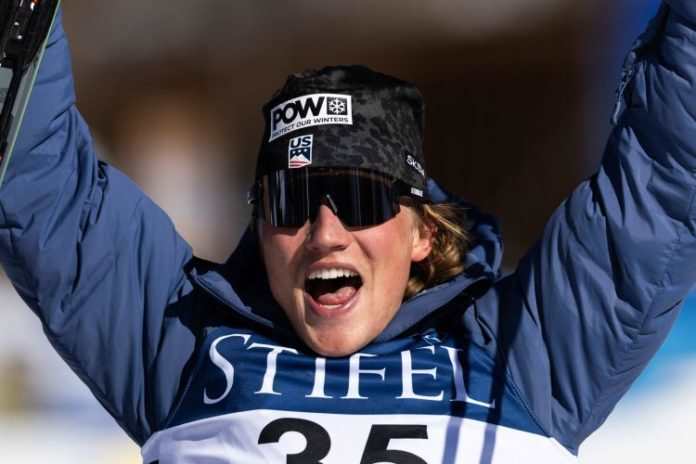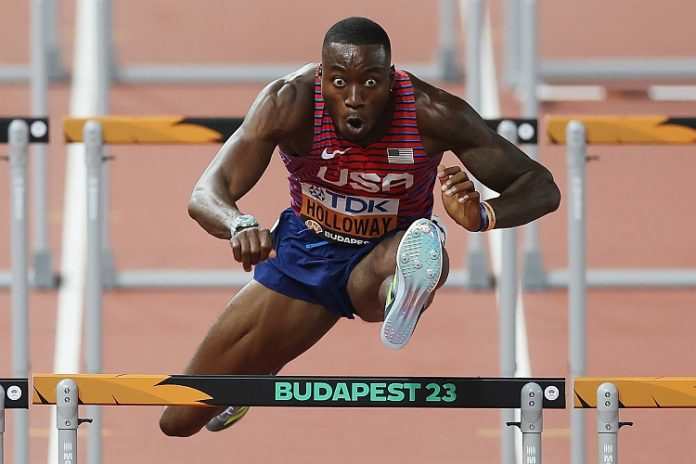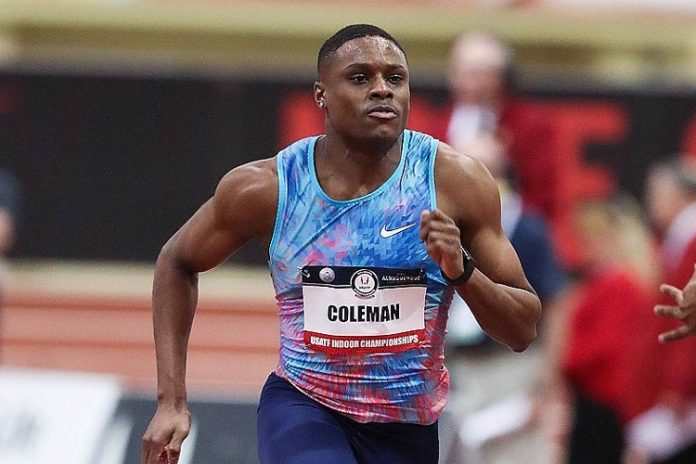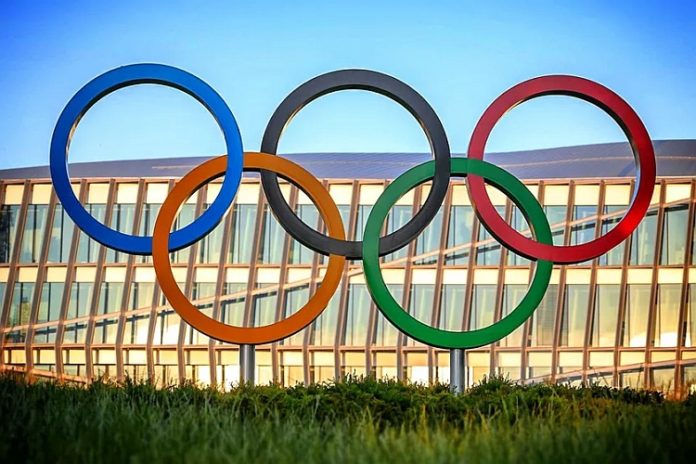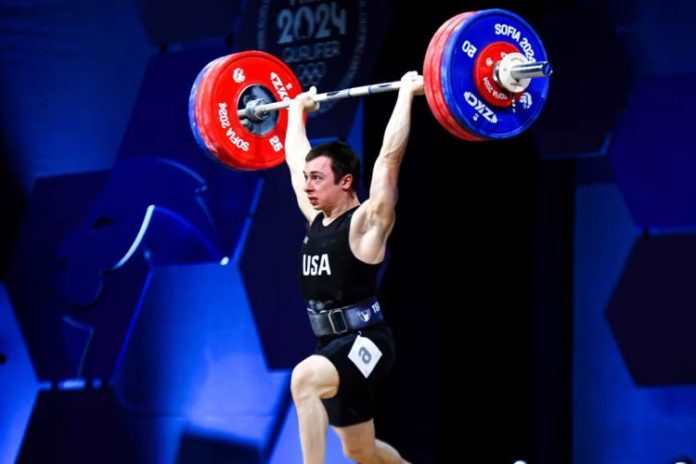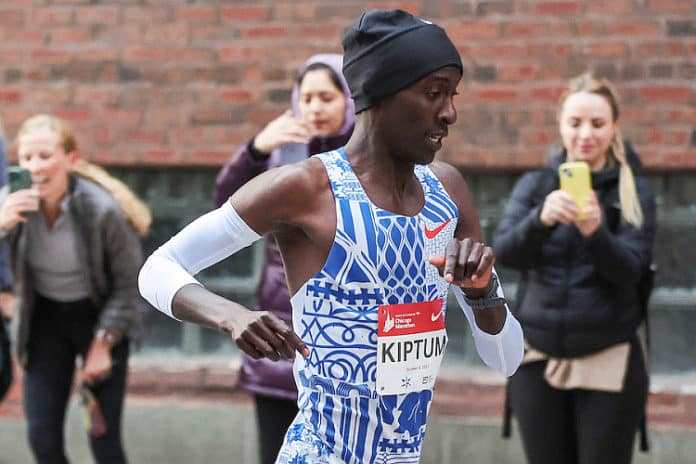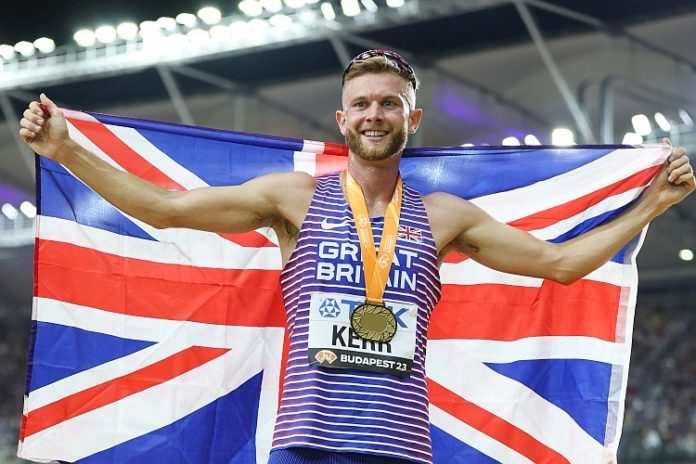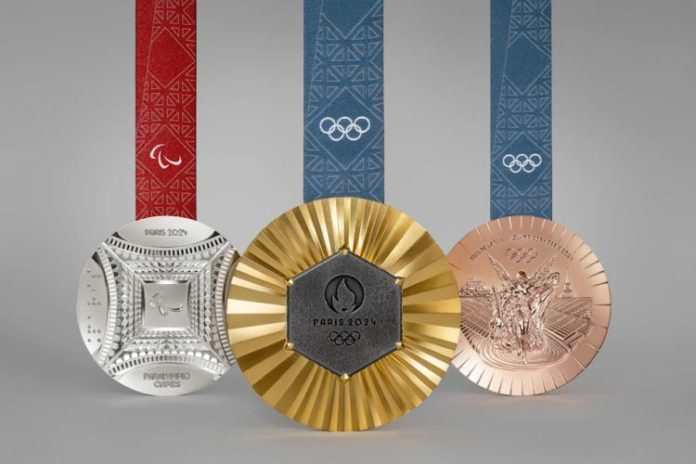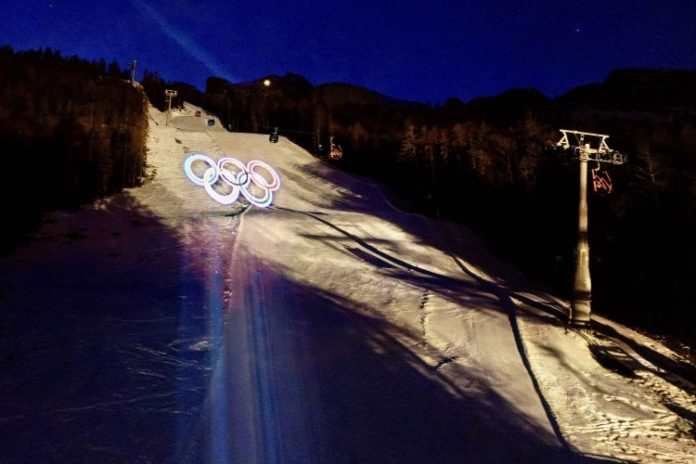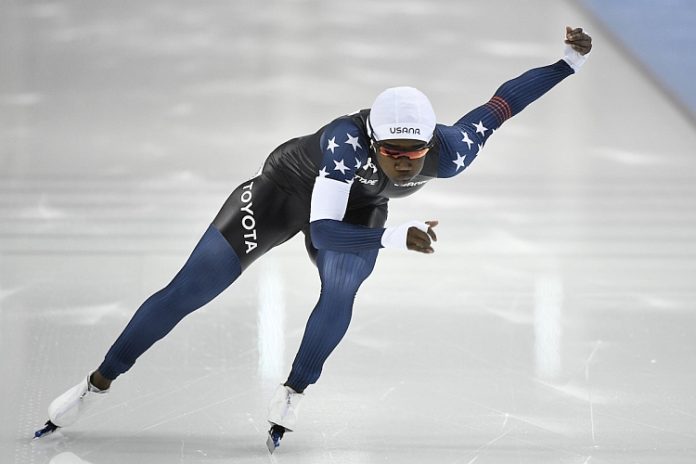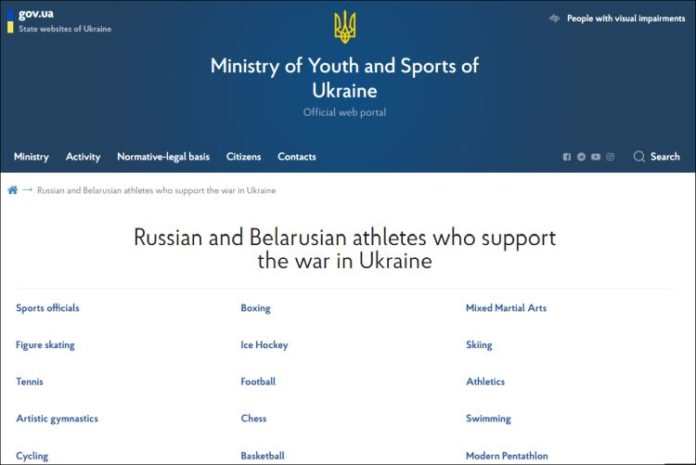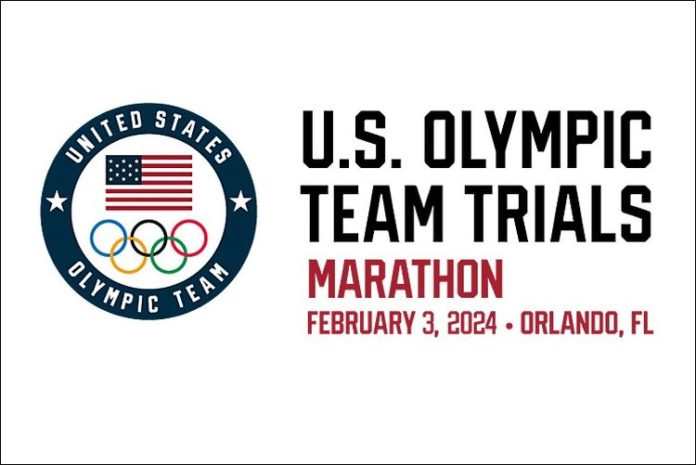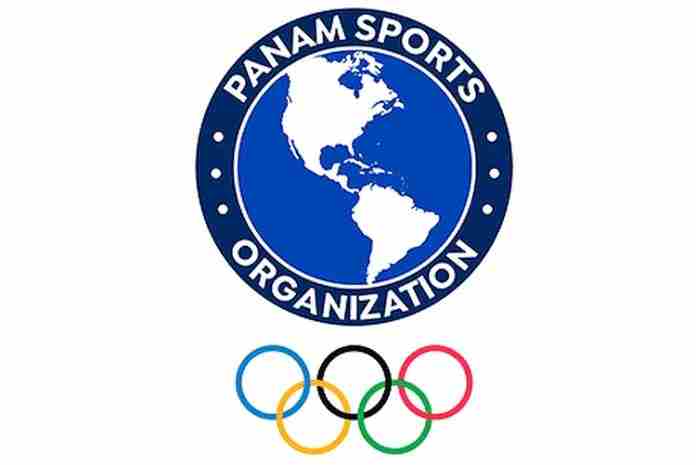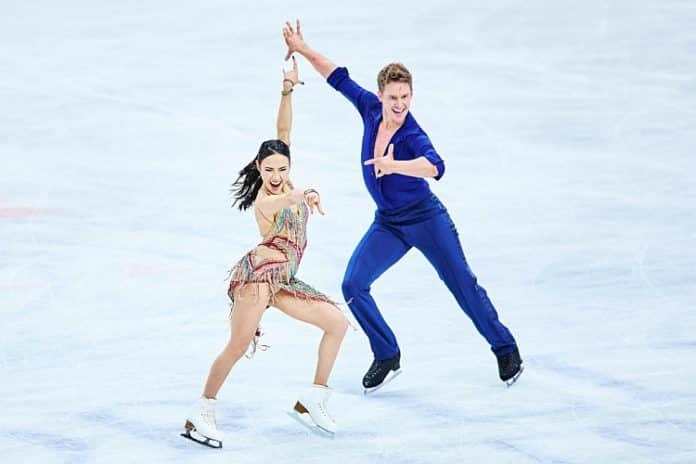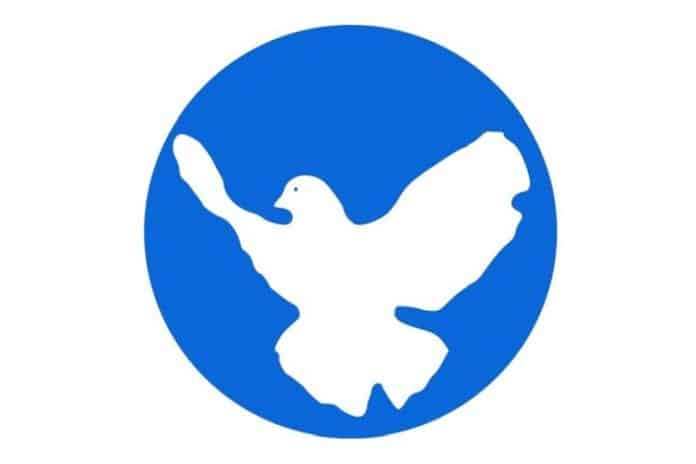★ The Sports Examiner: Chronicling the key competitive, economic and political forces shaping elite sport and the Olympic Movement.★
★ To get The Sports Examiner by e-mail: sign up here! ★
★ Yowsah! Thanks to 23 wonderful donors, we’re at 46.5% of our goal to cover technical and support costs. But we need your help too. Please consider a donation to help keep TSX going. Thank you. ★
≡ THE 5-RING CIRCUS ≡
1. Mantz and Young, O’Keeffe dominate U.S. marathon trials
2. FIFA World Cup 2026 to open in Mexico, finish in New Jersey
3. NHL players will return to Olympic Winter Games in 2026
4. Paris 2024 starts quick ticket releases to finish sales
5. Ukraine posts own list of “non-neutral” Russian athletes
● A compelling U.S. Olympic Marathon Trials in Orlando went to form in the men’s race, with time leaders Conner Mantz and Clayton Young finish 1-2 and qualifying for Paris 2024. The women’s race was a shocker as first-time marathoner Fiona O’Keeffe ran away with the race in a Trials record of 2:22:10, ahead of time leader Emily Sisson, a clear second and then surprise third-placer Dakotah Lindwurm.
● FIFA announced the match schedule for the massive, expanded 2026 World Cup in Canada, Mexico and the U.S., to begin at the Estadio Azteca in Mexico City and finish at MetLife Stadium in East Rutherford, New Jersey. Dallas’s AT&T Stadium will host the most matches with nine and will host one semifinal; Atlanta will have the other semi and Miami will host the third-place match.
● The National Hockey League, NHL Players Association and the International Ice Hockey Federation announced that an agreement was reached for NHL player participation in the 2026 and 2030 Olympic Winter Games, with the IIHF underwriting the major costs. NHL players did not play at the 2018 or 2022 Winter Games.
● Paris 2024 announced the first of a series of new ticket releases, this time to start on 8 February, in all sports, with some only offering a few new tickets. The statement noted that about eight of the 10 million Olympic tickets available have been sold so far.
● The Ukrainian government posted a massive list of Russian and Belarusian athletes, coaches and officials which it claims are not “neutrals” by the definition of the International Olympic Committee. Each name comes with a description of offenses; it’s a new element for the IOC’s “neutrality” authenticators to consider in advance of Paris 2024.
● World Championships: Aquatics (3: Doha Worlds begin, as stars van Rouwendaal and Rasovszky take open-water titles) = Sailing (Israel’s Kantor and Italy’s Renna pull IQFoil upsets) ●
● Panorama: Alpine Skiing (Yule posts historic worst-to-first win in Chamonix) = Athletics (3: 10 world leads at New Balance Grand Prix; Bol opens at 49.69 in Metz; Saruni hit for doping by ADAK) = Badminton (two for the home team at Thailand Masters) = Bobsled & Skeleton (Germans go four-for-four in Sigulda) = Curling (Shuster and Peterson repeat as U.S. champs) = Cycling (Wollaston wins three, Babic two at Track Nations Cup I) = Figure Skating (Kagiyama and Chiba wins highlight Four Continents in Shanghai) = Freestyle Skiing (3: Ferreira and Fraser win weather-shortened Halfpipes; Kingsbury and Horishima, Giaccio and Anthony takes Moguls wins; Mobaerg and Thompson star in Ski Cross) = Judo (host France shines in Paris Grand Slam with six golds) = Luge (Germany wins Singles in Altenberg World Cup) = Nordic Combined (Norwegian sweeps all at Seefeld as Riiber gets career medals record) = Ski Jumping (Forfang, Seifriedsberger and Opseth surprise in Willingen) = Snowboard (2: Totsuka and Ono win weather-shortened Mammoth Halfpipes; Grondin wins twice in SnowCross) = Speed Skating (U.S.’s Stolz wins four in last World Cup stage) ●
1.
Mantz and Young, O’Keeffe dominate U.S. marathon trials
At long last, the U.S. Olympic Marathon Trials was held in Orlando, Florida, under sunny conditions with starting temperatures just under 60 degrees when the men took off at 10:10 a.m.
In the end, the men’s race followed the script with the two favorites – Conner Mantz and Clayton Young – running comfortably to the finish, but women’s winner Fiona O’Keeffe stealing her race in a stunner.
¶
A big men’s pack moved together through the first six miles, with Zach Panning in the lead, then shrank to 14 by the 8-mile mark, with all of the favorites comfortably situated. Panning, in his fourth career marathon with a 2:09:28 best from 2022 and 13th at the 2023 Worlds, was in the lead through the half in 1:04:07, with Teshome Mekonen beside and 10 now in contention.
Ethiopian-born Mekonen took over at 14 miles; he became eligible to run for the U.S. in December 2022 and was in his fifth career marathon, having finished 24th in Berlin last October. Panning took over again at 15 miles, with Mekonen and U.S. qualifying leader Mantz right with him and 10 still running together.
Now the grinding started. Four-time Olympian and Rio 2016 marathon bronze winner Galen Rupp fell off the pace at 17 miles as the lead group shrunk to seven. Mekonen fell off the back at 18 miles and 13-time U.S. national distance champ Leonard Korir was showing signs of struggle to stay with the five in front of him.
Now came the break. Panning led at 19 miles, after miles of 4:44, 4:52 and 4:53, that broke everyone except Mantz and training partner and no. 2 time qualifier Young. Elkanah Kibet and Andrew Colley were five and six seconds back, and if Panning could keep this pace, he would run faster than the Olympic qualifying time of 2:08:10 (which Mantz and Young had already done).
So the racing on the street and against the clock was set. Panning clocked 4:51 to mile 20, on 2:07:38 pace. The three leaders slowed to 4:59 to mile 21, but were now 16 seconds clear of the field. They slowed significantly at 22 miles, at 5:07, with Mantz taking over and then to 5:06 for Panning at 23, which would have him finish beyond the 2:08:10 qualifying mark.
Young and Mantz moved ahead at 24, with a 5:09 mile and Panning dropped to third, now 19 seconds back. He was still third by 24 seconds, but his shot at an Olympic qualifying time was gone.
The two favorites coming in – Mantz and Young – picked up the pace to 5:03 at 25 miles, with Panning third (a 5:28 mile), but losing ground rapidly to Kibet, now three seconds behind him. Young and Mantz cruised past 26 miles at 5:16, with Korir and Kibet now 3-4.
Mantz won at 2:09:05 with Young one second back, and finish-line temps right at 70 degrees (F). Those are the nos. 2-3 performances ever in a men’s Olympic Trials marathon.
Korir out-sprinted Kibet for third in 2:09:57 to 2:10:02, but well short of the Olympic qualifying time, although there are possibilities for later inclusion. Korir’s time is the ninth-fastest in Trials history.
Manta and Young were the clear favorites going in and they showed their class and earned their ticket to Paris.
¶
The women’s race began at 10:20 a.m., and 14 were together through the first six miles, with 40-year-old Sara Hall, the Worlds fifth-placer from 2022, and former American Record holder Keira D’Amato taking turns in the lead. By eight miles, there were 13 in the lead pack and defending Trials champ Aliphine Tuliamuk had dropped to 24 seconds behind the leaders.
Marathon debutante O’Keeffe, the 2022 U.S. 10 Mile champ, took over at 10 miles, with the top 13 still bunched. Then Dakotah Lindwurm – in her 13th career marathon – grabbed the lead at 12 miles, and D’Amato edged to the front at 13. At the half, D’Amato, Lindwurm, O’Keeffe, Hall and Emily Durgin all crossed in 1:11:43 as temperatures were now in the mid-60s.
O’Keeffe popped back into the lead at 14, with the lead pack at 12. She remained there through mile 16, but suddenly D’Amato had dropped back, four seconds behind the lead pack of nine. Betsy Saina, 35, a Kenyan 10,000 m Olympian in 2016, but who transferred to the U.S. in 2021, was right in contention in her 11th career marathon. Lindwurm dropped back by the 17-mile mark, leaving seven in the lead group, on pace for a 2:23:13 finish.
Only five remained in contention by 18 miles, with O’Keeffe, American Record holder Emily Sisson, Hall, Saina and Durgin running together. Then Durgin dropped off the back at 19 as O’Keeffe – hardly a favorite to make the team – threw in a 5:22 mile to take a five-second lead at 19 miles.
And there was no let up. O’Keeffe hammered out a 5:20 mile and Sisson ran 5:25 to reach mile 20 in 1:48:57 and 1:49:07. Saina and Hall were at 1:49:20 and Durgin had caught up to them and now had a chance to make the team.
O’Keeffe kept pushing: 5:27 at mile 21, with now a 16-second lead in Sisson, and chaos behind them. Saina, Hall and Durgan all slowed to 5:47 miles and Caroline Rotich (5:36) and Lindwurm (5:39) moved in places 3-4! At 22 miles, O’Keeffe finished another 5:27 mile and had a 21-second lead on Sisson (5:32), with Lindwurm and 2015 Boston Marathon champ Rotich, 39, together, 35 seconds back and Hall chasing both, another nine seconds behind.
O’Keeffe stayed on the gas, running 5:21 to reach 23 miles with a 31-second lead on Sisson and looking unbeatable. Lindwurm and Rotich – who gained a U.S. affiliation only in October 2023 – were together at 3-4 and Hall was another 15 seconds down; Saina dropped out. O’Keeffe timed 5:23 to 24 miles, with Sisson cruising in second and Lindwurm and Rotich still together. Hall’s hopes had faded, now 28 seconds behind them.
Both O’Keeffe and Sisson punched hard to mile 25, running 5:09 and 5:10 and O’Keeffe maintained a 40-second lead in the race of her life. Lindwurm broke free of Rotich, running a 5:44 mile as Rotich faded to 5:55, and looked to be a solid third.
Sisson pressed, running a 5:15 miles to 5:22 for O’Keeffe to narrow the gap to 14 seconds by 26 miles, but O’Keeffe won going away in 2:22:10, moving her no. 10 all-time U.S. in her first race at the distance. It’s by far the fastest U.S. Olympic trials marathon ever, blasting Shalane Flanagan’s 2:25:38 from 2012.
Sisson was second at 2:22:42, her third-fastest ever, and Lindwurm, at 28, got third at 2:25:31, her third-fastest ever to get a trip to Paris. Jessica McClain passed the fading Rotich and Hall and got fourth (2:25:46), with Hall fifth at 2:26:06 and Rotich sixth at 2:26:10.
The top three times were the three-fastest in U.S. marathon trials history and this race now has seven of the all-time top 10.
There was $600,000 in prize money in this race, with the top 10 places receiving $80,000, $65,000, $55,000, $25,000, $20,000, $15,000, $13,000, $11,000, $9,000 and $7,000.
Much more to unpack from this race, but it was a considerable success for Mantz, Young and the stunning O’Keeffe, and after all the worries about weather, appeared to run smoothly with finish temperatures just about 70 at the end.
2.
FIFA World Cup 2026 to open in Mexico, finish in New Jersey
FIFA announced the playing schedule for the mammoth, 48-team FIFA World Cup 2026 on Sunday, distributing the 104 matches between the host countries Canada, Mexico and the United States.
The matches were distributed among the 16 stadia:
Canada (13 matches):
● 6: Toronto (BMO Field): 5 group stage, Round of 32
● 7: Vancouver (BC Place): 5 group stage, R32, R16
Mexico (13 matches):
● 4: Guadalajara (Estadio Akron/Zapopan): 4 group stage
● 5: Mexico City (Estadio Azteca): 3 group stage, R32, R16
● 4: Monterrey (Estadio BBVA/Guadalupe): 3 group stage, R32
U.S. (78 matches):
● 8: Atlanta (Mercedes-Benz Stadium): 5 group stage, R32, R16, SF
● 7: Boston (Gillette Stadium/Foxborough): 5 group stage, R32, QF
● 9: Dallas (AT&T Stadium/Arlington): 5 group stage, R32x2, R16, SF
● 7: Houston (NRG Stadium): 5 group stage, R32, R16
● 6: Kansas City (Arrowhead Stadium): 4 group stage, R32, QF
● 8: Los Angeles (SoFi Stadium/Inglewood): 5 group stage, R32x2, QF
● 7: Miami (Hard Rock Stadium/Miami Gardens): 4 group stage, R32, QF, 3rd
● 8: New York/New Jersey (MetLife Stadium/E. Rutherford): 5 group, R32, R16, Final
● 6: Philadelphia (Lincoln Financial Field): 5 group stage, R16
● 6: San Francisco area (Levi’s Stadium/Santa Clara): 5 group stage, R32
● 6: Seattle (Lumen Field): 4 group stage, R32, R16
The opening match will be played in Mexico City, with the climax of the tournament all in U.S. stadia:
● Quarterfinals: Boston, Kansas City, Los Angeles, Miami
● Semifinals: Atlanta, Dallas
● Third-place: Miami
● Final: New York/New Jersey
Dallas’s AT&T Stadium received the most matches at nine; MetLife Stadium in New Jersey was assigned eight matches, but has a gap of 13 days between a Round of 16 match and the final for preparation.
FIFA noted in its announcement:
“The tournament’s innovative match schedule will serve to minimise travel for teams and fans alike, while the number of rest days between fixtures will be maximised. Having been drawn up in consultation with key stakeholders, including national-team coaches and technical directors, the schedule will also increase the prospect of matches being played in the best possible conditions and ensure that fans have shorter travel times when following their teams.”
As an example, the U.S. team was assigned its group-stage matches in Los Angeles (2) and Seattle (1) to minimize cross-country travel.
Who plays where won’t be known for some time as the qualifying process continues. FIFA noted that the draw is likely to be held towards the end of 2025.
3.
NHL players will return to Olympic Winter Games in 2026
“There is a recognition of how important this is to the players, and in the spirit of cooperation – particularly the work that we did together during COVID – everybody felt on our side that it was the right thing to do.
“This really came down to doing something because the players really wanted it.”
That was NHL Commissioner Gary Bettman (USA) on Friday, announcing that the league and its Players Association had agreed with the International Ice Hockey Federation in terms to allow participation in the 2026 Olympic Winter Games in Milan-Cortina and for 2030, expected to held in the French Alps. Bettman wanted to make sure everyone understood the deal:
“Let me just add one thing, particularly for the NHL owners that are listening.
“The fact of the matter is, our agreement is we’re not responsible for any of the major costs, the big-ticket items. How the IIHF raises the funds, whether it’s from the IIHF or the organizing committee or the IOC for ’30, that will be their issue, not ours, and I want to be clear about that.”
This includes insurance to protect the NHL’s clubs from the risks of injuries, travel and family support. While the 2030 Winter Games have not been officially awarded yet, the French Alps bid is in “targeted dialogue” with the International Olympic Committee and is expected to be confirmed this summer, with the ice hockey venue in Nice.
In addition, a new, “Four Nations Face-Off” tournament will be held in 2025, featuring national teams from Canada, the U.S., Sweden and Finland, to be held next February at two sites in Canada and the U.S. Said Bettman:
“We know how important international competition is to our players. We know how much they love and want to represent the countries from which they’re from, and we think this is great stage for the best on best in what obviously we all believe is the best sport.”
NHL players first participated in 1998 and then in 2002-06-10-14, but skipped PyeongChang in 2018 and Beijing in 2022. IIHF chief Luc Tardif (FRA) was overjoyed:
“This decision represents a turning point for ice hockey at the global level and marks the great return of the NHL players to the Olympic Games. The IIHF was able to gather all related stakeholders at the same table to find a long-lasting and sustainable consensus, which is the backbone of what we intend to do as sports organizations.
“As prime hockey fans, the IIHF is obviously thrilled and excited about this unprecedented agreement, we are already looking forward to witnessing the best of ice hockey at these upcoming Winter Olympic Games in Milano and in 2030.”
Bettman also commented on the under-construction arena in Milan scheduled to host the 2026 tournament:
“There’s a lot of construction that remains to be done on that building. I think they only recently started. But we’re being told by everybody not to worry. But I like to worry, so we’ll see.”
4.
Paris 2024 starts quick ticket releases to finish sales
“There will be a series of ticket releases at regular intervals over the next few weeks and up to Games time, offering many opportunities to buy tickets for this exceptional event.
“These surprise releases by the Paris 2024 ticket office (which will be announced only a few days in advance) will give you the chance to buy tickets for all the sports of the Games!”
Last week’s announcement began the latest ticket push from the Paris 2024 organizers, with the newest batch of tickets coming to market on Thursday, 8 February at 10 a.m. local time:
● Tickets for all sports will be offered, but some with just a few tickets available
● New tickets for all four Olympic and Paralympic ceremonies will be available.
● 45% of the tickets will be priced at €100 or less (€1 = $1.08)
The statement noted, “Of the 10 million tickets available for the Olympic Games, just under 8 million have already been taken up.”
A quick check of the Olympic Opening Ceremony on 26 July showed only the top category – €2,700 only – offered as available.
Often asked: why are these tickets suddenly available now? The answer is, essentially, timing. As the plans for the Games are finalized – really finalized – for details such as placement of scoring, television and security equipment, ticketed spaces held in reserve can be freed. Same for tickets (and spaces) reserved for sponsors, officials, media, National Olympic Committees, International Federations and other groups; as the quotas for each are finalized, tickets become available for the public.
This process will go on right through the Games. For now, Paris 2024 is making available these freed-up spaces for sale as soon as it can.
5.
Ukraine posts own list of “non-neutral” Russian athletes
The Ministry of Youth and Sports of Ukraine posted Saturday a massive list of more than 1,000 Russian athletes, coaches and officials which it says are “Russian and Belarusian athletes who support the war in Ukraine.”
The list has 52 categories, with 51 for various sports and one for sports officials. Each category is a separate page, with a list on each of individuals, then with details for each upon clicking the name. Some are current athletes who might qualify for Paris 2024, but many are also former athletes, coaches or officials.
Boxing alone has 161 names listed, including International Boxing Association President Umar Kremlev (RUS). His file entry includes:
“Evidence has come to light, exposing Kremlev’s possession of a map of Russia displayed prominently in his office, which includes the illegally annexed region of Crimea as part of Russian territory. This overt display of support for the occupation has sparked condemnation from athletes, boxing enthusiasts, and human rights activists, who vehemently oppose the violation of international law and the sovereignty of Ukraine.”
The entry – under Fencing – for Russian Olympic Committee chief Stanislav Pozdnyakov notes in part:
“Pozdnyakov’s active participation in mass gatherings and public statements endorsing the Russian armed forces, along with his statement suggesting that Russian athletes should be honored to fight in the war in Ukraine following Vladimir Putin’s order for a partial mobilization of troops, has faced significant criticism.
“Many argue that as the head of the Russian Olympic Committee, Pozdnyakov has a responsibility to prioritize peace, diplomacy, and fair competition, which are fundamental principles of the Olympic Games. His statements advocating for athletes’ involvement in war are seen as contradictory to the spirit of sportsmanship and global unity that the Olympic movement aims to foster.”
In just the summer Olympic sports in which Russians or Belarusian could participate in Paris – which excludes all team sports – the lists identify 583 individuals as suspect:
● 161: Boxing
● 94: Wrestling (Freestyle)
● 84: Cycling
● 45: Gymnastics (Artistic)
● 37: Judo
● 29: Cycling (Mountain Bike)
● 22: Tennis
● 19: Wrestling (Greco-Roman)
● 12: Diving
● 10: Cycling (BMX)
● 10: Swimming
● 10: Taekwondo
● 9: Weightlifting
● 8: Athletics
● 8: Archery
● 6: Triathlon
● 5: Gymnastics (Rhythmic)
● 4: Fencing
● 2: Modern Pentathlon
● 2: Sport Climbing
● 2: Swimming (Artistic)
● 1: Rowing
● 1: Sailing
● 1: Table Tennis
● 1: Shooting
There are further lists for team sports, winter sports (29 figure skaters, 28 biathletes, 13 Freestyle skiers, 18 ice hockey players and so on). For athletes, this entry is typical:
“Two-time Olympic swimming champion Yevgeny Rylov has publicly expressed support for Russia’s actions in Ukraine and has participated in mass events aimed at justifying Russia’s military aggression against Ukraine.
“The swimmer attended a concert in honor of the illegal annexation of Crimea and support for the war in Ukraine. During the concert at the Luzhniki Stadium, Rylov wore the letter ‘Z’ on his attire. The letter is associated with the ‘Zhogolev’ movement, a pro-Russian group that advocates for the annexation of Ukrainian territories.”
For judo, the top entry cites “The Russian national judo team (all are military personnel)”; this is especially interesting since the International Judo Federation has approved as “neutrals” many Russian athletes now competing in IJF World Tour events.
It’s an enormous effort, but one which coincides with the International Olympic Committee’s promise to check the “neutrality” of possible Russian or Belarusian entry for Paris itself, with its own contractor. It underlines the importance to Ukraine of the propaganda value of any Russian or Belarusian participation in Paris this summer.
≡ WORLD CHAMPIONSHIPS ≡
● Aquatics ● The first World Aquatics Championships to be held in an Olympic year opened in Doha (QAT), with some familiar stars at the top of the podium already:
In open-water swimming, the Rio 2016 Olympic champ Sharon van Rouwendaal (NED) came from behind to pass Maria de Valdes (ESP) on the final lap of the 10 km final and touched first to win her second Worlds gold in 1:57:26.8 to 1:57:26.9. Portugal’s Angelica Andre was a little further back in third (1:57:28.2), with Mariah Denigan the top American in a tie for fifth (1:57:31.1).
Fellow American Katie Grimes was 15th in 1:57:39.4. It’s the first Worlds medal for both de Vales and Andre.
On Sunday, Hungary’s Kristof Rasovszky won his first World title in the men’s 10 km, out-lasting Britain’s Hector Pardoe on the final lap and winning in 1:48:21.2. He had previously won the Worlds 5 km gold in 2019. France’s Marc-Antoine Olivier came hard at the finish to pass Pardoe and win the silver, 1:48:23.6 to 1:48:29.2, Olivier’s second Worlds silver in the event (also in 2019).
Ivan Puskovitch of the U.S. was 14th in 1:48:54.4 and teammate Michael Brinegar was 19th (1:49.18.8).
¶
As China did not send several of its top divers to Doha, the competition was wide open for the first time in recent memory. China did win the Mixed 19 m Platform final, with 13-year-old Jianjie Huang and Jiaqi Zhang (19) scoring a near-50 point win at 353.82 over North Korea and Mexico.
Two Chinese stars who did come to Doha included Olympic men’s 3 m Synchro champs Daoyi Long and Zongyuan Wang, the two-time defending World Champions. They won their third in a row with ease, scoring 442.41 against Lorenzo Marsaglia and Giovanni Tocci (ITA: 384.24) and Adrian Abadia and Nicolas Garcia (ESP: 383.28). The U.S. pair of Andrew Capobianco and Quentin Henninger finished ninth (351.18).
Great Britain won the Mixed Team event at 421.65, ahead of Mexico (412.80) and Australia (385.35) and Mexico’s Osmar Olvera took the men’s 1 m Springboard title at 431.75 over Shixin Li (AUS: 395.70) and Ross Haslam (GBR: 393.10). Lyle Yost was ninth for the U.S. (347.25). Olvera moved up from silver at the Fukuoka Worlds in 2023.
The women’s 1 m Springboard went to Alysha Koloi (AUS: 260.50) for her first Worlds medal, ahead of Grace Reid (GBR: 257.25) and Maha Eissa (EGY: 257.15). It was Reid’s first individual Worlds medal. Americans Hailey Hernandez and Alison Gibson finished 6-7 at 249.60 and 249.35.
¶
In Artistic Swimming, Greece’s Evangelia Platanioti moved up from bronze in 2022 to win the women’s Solo Technical event at 272.9633, trailed by Canada’s Jacqueline Simoneau (269.2767) and China’s Huiyan Xu (262.3700). It was the first Worlds medals for Simoneau and Xu.
In the Mixed Duet Technical final, Nargiza Bolatova and Eduard Kim (KAZ) won at 228.0050, ahead of Wentao Cheng and Haoyu Shi (CHN: 223.3166) and Miranda Barrera and Diago Villalobos (MEX: 217.5192).
China won the Mixed Team Acrobatic Routine, scoring 244.167 to edge Ukraine (243.3167) and the U.S. got third at 242.2300. Bill May, 45, a pioneer men’s artistic performer, won his sixth Worlds medal (1-2-3).
The championships continue through the 18th.
● Sailing ● The IQFoil class will debut at the Paris 2024 Olympic Games, but held its 2024 World Championships at Lanzarote (ESP), finishing on Saturday, with upsets in both the men’s and women’s Grand Final.
Britain’s Emma Wilson had dominated the racing, winning 15 of 20 races and advanced directly to the Grand Final. She was joined by two Israelis, Sharon Kantor, who had five in her groups, and Katy Spychakov (four wins). And Wilson, who won a Tokyo Olympic silver in 2021 in the RS:X class (being replaced by IQFoil), took the lead quickly in the final, but was passed by the 20-year-old Kantor for an upset gold. It’s Kantor’s first World title, up from seventh at the 2023 World Sailing Champs in the same event; she was the Paris 2024 test event winner as well. Spychakov finished third for the bronze.
Defending men’s champion Luuc van Opzeeland (NED) – winner of bronze, silver and gold in his last three Worlds – was also the big winner during the tournament, taking 10 of 20 races and advancing to the Grand Final. But World Sailing Champs bronze winner Nicolo Renna (ITA: 4 wins) was waiting and when van Opzeeland and Pawel Tarnowski (POL) pulled ahead and went left, he went right and sailed home the winner, with Tarnowski second and van Opzeeland third. Renna had moved up from 23rd in his first IQFoil Worlds to sixth to third, to gold.
≡ PANORAMA ≡
● Alpine Skiing ● History in Chamonix (FRA) on Sunday in the only FIS Alpine World Cup race to be held on the weekend due to bad weather, as Swiss Daniel Yule became the first skier to ever go from worst to first in a single race.
He almost skied off the course on his first run and expected to be eliminated, but placed 30th (49.02) as the final qualifier. That means he went first in the final run and blazed to a 47.22 timing that turned out to be so fast that he won the race! His combined time of 1:36.24 was 0.18 faster than first-run leader Clement Noel (FRA: 1:36.42), who dropped to third as fellow Swiss Loic Meillard finished at 1:36.40 to grab the silver. Crazy.
Jett Seymour was the top American in 28th (1:37.26). “Absolutely incredible,” said Yule. “I’ve got to say I got really lucky staying 30th after the first run, but then I managed to ski an amazing second run.” It’s Yule’s seventh career World Cup win, all in Slaloms.
● Athletics ● The first heavyweight indoor meet in the U.S. in 2024 was the New Balance Indoor Grand Prix at The Track at New Balance in Boston, and it was hot, with world-leading marks in a fabulous 10 events:
● Men/60 m: 6.44, Noah Lyles (USA)
● Men/1,000 m: 2:14.74, Marco Arop (CAN)
● Men/1,500 m: 3:33.66, Hobbs Kessler (USA)
● Men/3,000 m: 7:29.09, Lamecha Girma (ETH)
● Men/60 m hurdles: 7.37 (heats), Grant Holloway (USA)
● Men/60 m hurdles: 7.35, Grant Holloway (USA)
● Women/300 m: 35.75, Gabby Thomas (USA)
● Women/1,500 m: 3:58.11, Gudaf Tsegay (ETH)
● Women/3,000 m: 8:24.93, Jessica Hull (AUS)
● Women/60 m hurdles: 7.72, Tia Jones (USA)
● Women/Long Jump: 6.86 m (22-6 1/4), Tara Davis-Woodhall (USA)
Lots of excitement in the men’s 60 m, with 2022 World 100 m champ Fred Kerley and 2023 winner Noah Lyles in the field. In the final, Jamaica’s Ackeem Blake got out well and Lyles had work to do to catch up, but he got there with a stride left and crossed first in 6.44, the world leader and now equal-10th all-time. Blake was second at 6.45, Ronnie Baker (USA) was an encouraging third (6.54) and Kerley fourth (6.55) in his first indoor 60 m ever.
The men’s 1,000 m almost produced a world record. Canada’s World 800 m champ Marco Arop took off at the gun and had a 40 m lead at the bell, and stormed home in a sensational 2:14.74, the no. 2 performance of all-time. Americans Bryce Hoppel and Sam Ellis were 2-3, but far behind, in 2:16.91 and 2:17.10.
The men’s 1,500 m settled into a 1v1 duel over the final lap between 20-year-old Hobbs Kessler of the U.S., the 2023 World Road Mile gold medalist and 2022 World 1,500 m champ Jake Wightman (GBR). Kessler stayed strong and although Wightman was closing, he ran out of room as Kessler took the world lead at 3:33.66 with Wightman at 3:34.06, his best-ever indoors. Americans Craig Engels and Sam Prakel were 3-4 at 3:37.04 and 3:37.24.
Ethiopian Steeple star Lamecha Girma, the world indoor 3,000 m record man, made a hard run at his own mark, shredding the field with seven laps to go and then pushing hard to finish in 7:29.09, the world leader, but short of his 7:23.81 mark from 2023. Kenyan Edwin Kurgat was a distant second in 7:39.38.
World 60 m hurdles record holder Grant Holloway of the U.S. took the world lead in the 60 m hurdles heats at 7.37 and then blew away an excellent field by the third hurdle if the final and won going away in another world-leading mark of 7.35, the equal-8th performance all-time. Fellow Americans (and Worlds medal winners) Trey Cunningham (7.49), Daniel Roberts (7.49) were 2-3. It’s the fifth time Holloway has run 7.35 and he owns nine of the top 12 times in history.
Home favorite – and former Harvard star – Gabby Thomas felt a bit ill, but had plenty coming off the final turn to win the women’s 300 m in a very fast 35.75, a world leader and no. 8 performance of all time. Nigeria’s Favour Ofili was game, but second in 35.99.
World-record holder Gudaf Tsegay (ETH) headlined the women’s 1,500 m field, and she and countrywoman Birke Haylom, 18, ran away from the field with 3 1/2 laps to go and Tsegay maintained a solid pace and won in a world-leading 3:58.11, the no. 11 performance ever. Haylom was never far behind, but could not get close and clocked 3:58.43, no. 5 ever. American Emily MacKay was a distant third in 4:05.04.
Elle St. Pierre, the Tokyo 1,500 Olympian, returned from maternity in the women’s 3,000 m and broke away with Australian Jessica Hull with five laps left. St. Pierre led until the final turn, when Hull finally managed to get by and raced to the line first in a national indoor record and world-leading mark of 8:24.93, and now no. 6 all-time. St. Pierre ran 8:25.25, moving her to no. 2 all-time U.S.
American Tia Jones got a great start in the women’s 60 m hurdles and got to the line in a world-leading 7.72, beating Nigeria’s outdoor world-record holder Tobi Amusan (7.75) and prior world leader Devynne Charlton (BAH: 7.76). Jones is now equal-fifth all-time and equal-third all-time U.S.
Tara Davis-Woodhall, the 2022 Worlds long jump runner-up, took the world lead on her first try at 6.86 m (22-6 1/4), and backed it up at 6.83 m (22-5) in rounds three and six. Fellow American Quanesha Burks was second at 6.64 m (21-9 1/2).
Although not world-leaders, there are multiple other strong performances.
In the men’s 400 m, 2023 Worlds fourth-placer Vernon Norwood took the lead coming into the first home straight and held strong to win in 45.76, now no. 5 on the world list for 2024. South Africa’s Zak Nene was second in 46.15.
The 2022 World Indoor runner-up Mikiah Brisco of the U.S. got the lead by 20 m in the women’s 60 m and held it to the end, winning in 7.10, to 7.15 for fellow American Celera Barnes.
Kendall Ellis got cut off by Jamaica’s Junelle Bromfield trying to make the lead in the women’s 400 m after a lap, but stayed cool and zoomed past everyone off the final turn to win in 52.77, ahead of Raevyn Rogers (USA: 53.00) and Helena Ponette (BEL: 53.43).
¶
Impressive start to the indoor season for Dutch star Femke Bol, the Worlds 400 m hurdles gold medalist in 2023, winning the 400 m at the Meeting Metz Moselle in Metz (FRA) in a world-leading 49.69. It’s her third-fastest time ever in the event, notably behind her World Indoor Record of 49.26 in 2023. She also won the 200 m in Metz on Saturday in 22.64, a lifetime best and a Dutch indoor record!
Ethiopia’s Hirut Meshesha, the 2023 Worlds Indoor 1,500 bronze winner, won the women’s 3,000 m in a world-leading 8:28.46, a lifetime best, and now no. 13 all-time.
¶
Another notable doping sanction in Kenya, this time of 1:43.25 800 m runner Michael Saruni, 28, banned for four years to 30 August 2027 for “Evading, Refusing or Failing to Submit to Sample Collection.” He lasted competed in 2022
The ruling came from the Anti-Doping Agency of Kenya (ADAK), which has been bolstered by government funding to root out epidemic doping, especially in athletics. It’s their 13th suspension of a Kenya athlete that took effect in 2023 alone.
● Badminton ● The home team got to the finals in four of five events at the Thailand Masters in Bangkok, and came away with two wins, both in Doubles.
In the women’s final, Benyapa Aimsaard and Nuntakarn Aimsaard (THA) fought off Yi Jing Li and Xu Min Luo (CHN) in a thriller, 21-13, 17-21, 27-25, while top-seeded Dechapol Puavaranukroh and Sapsiree Taerattanachai (THA) took the Mixed Doubles title by 21-12, 21-18 over Tang Jie Chen and Ee Wei Toh (MAS).
The women’s Singles final had three-seed Aya Ohori (JPN) taking down fourth-seed Supanida Katethong (THA) by 18-21, 21017, 21013. And China’s Ji Ting He and Xiang Yu Ren came from behind to win the men’s Doubles, 16-21, 21-14, 21-13, over Peeratchai Sukphun and Pakkapon Teeraratsakul (THA).
A mild upset in the men’s Singles had no. 5 seed Tien Chen Chou (TPE) win over second-seeded Kean Yew Loh (INA), 21-16, 6-21, 21-16.
● Bobsled & Skeleton ● Germany continued its winning ways at the IBSF World Cup in Sigulda (LAT), but with surprises.
In the Two-Man, a German sled won for the fourth time in five events, but it was the first win of the season for Adam Ammour, previously third twice. He and Benedikt Hertel had the fastest times on both runs and finished at 1:39.33, ahead of Swiss Michael Vogt and Sandro Michel (1:39.45) and twice Olympic champ Francesco Friedrich (1:39.48). Frank Del Duca and Hakeen Abdul-Saboor had the fastest American sled in eighth (1:40.34).
The first of two Two-Woman races saw 2023 World Champs Kim Kalicki and Leonie Fiebig (GER) lead a sweep and win their second straight World Cup in 1:41.53, ahead of Olympic champs Laura Nolte and Claudia Schussler (1:41.57) and Lisa Buckwitz and Vanessa Mark (1:41.65). Americans Elana Meyers Taylor and Sydney Milani tied for seventh (1:42.49).
The second races, on Sunday, had Nolte and Neele Schuten winning in 1:41.53, with Kalicki and Anabel Galander second (1:41.82) and Swiss Melanie Hauser and Mara Morell (1:42.06) third. Meyers Taylor and Azaria Hill finished fifth (1:42.41).
Buckwitz, the 2018 Olympic Two-Women champ, took the Monobob in 1:47.46, ahead of Andreea Grecu (ROU: 1:47.73) and Nolte and Meyers Taylor tied for third (1:47.87). American Kaysha Love was fifth (1:48.23).
China’s Yin Zheng won his first Skeleton medal of the season at 1:40.82, followed by Britain’s Marcus Wyatt (1:41.00) and 2023 World Champion Matt Weston (1:41.16). American Austin Florian was fifth (1:41.37).
The 2023 Worlds bronze medalist, Mirela Rahneva (CAN) took the women’s Skeleton title – her first gold of the season – in 1:43.10, beating Kim Meylemans (BEL: 1:43.38) and 2022 Olympic winner Hannah Niese (GER: 1:43.41). Veteran Katie Uhlaender was the top American, in 12th (1:44.18).
● Curling ● The evergreen John Shuster led his rink to yet another title at the USA Curling National Championships in East Rutherford, New Jersey on Sunday.
Shuster, now 41, who led his team to the 2018 Olympic gold, lost to Korey Dropkin’s rink by 9-5 in their play-off opener, moving Shuster to a semifinal against Daniel Casper. Shuster’s squad had a 6-2 lead into the ninth end, but Casper closed to 6-5, then a score in the 10th made the final 7-5.
That put Shuster and Dropkin into the final. In a see-saw match, Dropkin took a 3-0 lead in the second, with Shuster tying by the fifth, Dropkin up 4-3 after six ends and then Shuster exploding for five points in the seventh for an 8-5 lead. Dropkin got one back in the eight, but Shuster scored three more in the ninth for the 11-6 final.
Shuster had familiar help from Chris Plys and Matt Hamilton, plus Colin Hufman this time. It’s Shuster’s seventh U.S. title and fourth in the last five tournaments.
Defending women’s champion Tabitha Peterson also defended her title, defeating Sarah Anderson in their play-in game, 7-4. Anderson’s rink eliminated Delaney Strouse’s squad by 11-7 and earned a championship rematch. But six points in the fourth and fifth ends gave Peterson a 7-2 lead and led to the 10-5 final.
Peterson’s squad once again included Cory Thiesse, sister Tara Peterson and Becca Hamilton for the second straight year. It’s Tabitha Peterson’s third national title all-time and all in the last three years.
● Cycling ● The first UCI Track Nations Cup was held in Adelaide (AUS), with interesting results from lesser-known stars to open the season.
Japanese sprinter Kaiya Ota won the men’s Sprint over home favorite Matthew Richardson, the 2022 Worlds runner-up, and followed up with a silver in the Team Sprint (won by Australia) and then a bronze in the Elimination Race, taken by Malaysia’s Mohd Azizul Awang, the Tokyo 2020 Olympic Keirin runner-up.
Canada’s Dylan Bibic, 20, the 2022 World Scratch Race champ, beat Italian veteran Elia Viviani in the Omnium and won the Elimination Race as well. New Zealand’s Aaron Gate and Campbell Stewart, last year’s Worlds bronzers, took the Madison race.
New Zealand’s Ally Wollaston, who won a Worlds silver in 2023 in the Team Pursuit, won two individual women’s golds, in the Elimination Race (over American star Jennifer Valente) and in the Omnium, beating Britain’s two-time Olympic gold medalist Katie Archibald and Tokyo Olympic Omnium champ Valente.
Archibald and Elinor Barker teamed up to win the Madison over 2023 Worlds runners-up Georgia Baker and Alexandra Manly (AUS) and Valente and Lily Williams of the U.S.
Wollaston won a third gold in the Team Pursuit for New Zealand, with Archibald and Barker leading Britain to the silver and Baker and Manly helping Australia to the bronze.
In the Sprints, Germany’s eight-time Worlds gold medalist Emma Hinze won the women’s Sprint over Japan’s two-time Worlds Keirin runner-up Mina Sato, but Sato took the Keirin for herself.
Next: round two comes in Hong Kong from 15-17 March.
● Figure Skating ● Japan and Canada won two events each at the ISU Four Continents Championships in Shanghai (CHN).
Beijing 2022 runner-up Yuma Kagiyama took the men’s title with his no. 2 score ever of 307.58, dominating the field, with countryman Shun Sato (274.59) second and Jun-hwan Cha (KOR: 272.95) in third. Andrew Torgashev of the U.S. was eighth (237.20).
Eighteen-year-old Mone Chiba from up from third in this event in 2023 to take the women’s title, scoring 214.98 to 204.68 for Chae-yeon Kim (KOR) and 2:02.17 for Rinka Watanabe (JPN). Ava Marie Ziegler (USA), 17, was fourth at 201.19. Chiba won both the Short Program and the Free Skate.
Canada’s Deanna Stellato-Dedek and Maxime Deschamps took the Pairs title, with winning both segments, at 198.80, well ahead of Rika Miura and Ryuichi Kihara (JPN: 190.77) and Americans Ellie Kam and Danny O’Shea (187.28). Stellato-Dudek and Deschamps also moved up from the 2023 bronze.
Two-time Worlds bronze winners Piper Gilles and Paul Poirier forged a clear lead in the Rhythm Dance and won the Free Dance to win their first Four Continents gold at 214.36, ahead of teammates Laurence Fournier Beaudry and Nikolaj Sorensen (CAN: 207.54, their second straight silver) and American pairs Christina Carreira and Anthony Ponomarenko (194.14) and Emilea Zingas and Vadym Kolesnik (193.07).
The 2024 ISU Worlds come next, from 18-24 March in Montreal (CAN).
● Freestyle Skiing ● Two-time Olympic medal winner Alex Ferreira came to the Toyota U.S. Grand Prix (and FIS World Cup) Halfpipe in Mammoth Mountain, California having won the first two World Cups of the season. He won the third, too, but not in the way he expected.
Heavy weather canceled the finals, so the Tuesday qualification results ended up standing as final. And Ferreira led at 87.00, followed by fellow Americans Hunter Hess (86.50) and three-time Olympic medalist Nick Goepper (86.00).
Canadian Amy Fraser got her first World Cup gold at 85.50, followed by Olympic champ Eileen Gu (CHN: 83.50) and Zoe Atkin (GBR: 82.50).
Saturday’s Slopestyle final was held, with a U.S. 1-2 for Beijing Olympic champ Alex Hall (86.66) and 2021 Worlds runner-up Colby Stevenson (84.88) with 2021 World Champion Andri Ragettli (SUI: 83.45) in third.
Swiss star Mathilde Gremaud won the first two Slopestyles of the season and won again at Mammoth at 66.30, beating Americans Eleanor Andrews (61.20) and transgender Jay Riccomini (53.38).
¶
The Moguls skiers were in Deer Valley, Utah, with some familiar outcomes, as Canada’s Mikael Kingsbury won his record 85th career World Cup gold in the Moguls final over 2017 World Champion Ikuma Horishima (JPN), 82.17 to 79.15.
Horishima took the Dual Moguls gold, beating France’s two-time Worlds silver winner Benjamin Cavet in the final, with American Dylan Marcellini winning the bronze race.
There was a shock in the women’s Moguls final, as Australian star Jakara Anthony, who had won all six events so far, was eliminated in the first finals run and Beijing Olympian Olivia Giaccio of the U.S. led a 1-2 with Beijing 2022 runner-up Jaelin Kauf at 75.42 and 70.87. It was Kauf’s fourth silver this season, out of seven events!
Anthony got back on track in the Dual Moguls, defeating Kauf in the final, with Giaccio winning the bronze race. In Dual Moguls this season, Anthony has five wins, Kauf has three straight silvers and Giaccio has three straight thirds. Between the three, they have won 15 of the 18 medals awarded!
In Aerials, Canadian Alexandre Duchaine, 19, scored 102.57 to win his first-ever World Cup medal – a gold – over Connor Curran, 19, of the U.S. (102.22), with two-time Worlds winner Guangpu Qi (CHN: 100.81) third. American Winter Vinecki won her second straight World Cup at 77.90, beating Australia’s three-time Worlds medalist Danielle Scott (77.90) on a tie-breaker and Abbey Willcox (AUS: 76.85).
¶
Two FIS World Cup SkiCross races were held in Allegre (ITA), with two-time Worlds medalist Erik Mobaerg (SWE) winning the first men’s race over 2021 World Champion Alex Fiva (SUI), and Reece Howden (CAN) won his second race of the season over Worlds runner-up Florian Wilmsmann (GER).
The women’s winners were India Sherret (CAN), the 2015 World Junior champ over Saskja Lack (SUI), and 2014 Olympic champ Marielle Thompson (CAN) won the second event, ahead of 2018 Olympic silver winner Brittany Phelan (CAN).
● Judo ● Lots of interest in the IJF World Tour’s Paris Grand Slam, a dress rehearsal for the Olympic tournament to come this summer, with 621 judoka from 107 nations on hand, including superstar (and 11-time World Champion) Teddy Riner.
And the French were on fire in front of their home crowd, winning six golds and 12 medals overall to dominate this tournament. They started by winning four classes on Saturday, with victories for Tokyo bronze winner Luka Mkheidze in the men’s 60 kg class, World silver medalist Shirine Boukli in the women’s 48 kg, Faiza Mokdar at 57 kg and Tokyo Olympic champ Clarisse Agbegnenou at 63 kg.
On Sunday, 2022 World women’s +78 kg champ Romane Dicko won her class and then Riner thrilled the crowd with another victory in the men’s +100 kg class, over Korea’s Min-jong Kim.
Japan also sent a strong team, with wins by Takeshi Takeoka in the men’s 66 kg, Tatsuki Ishihara at 73 kg and Tokyo 2020 gold winner Aaron Wolf in the men’s 100 kg final, beating Spain’s 2021 World Champion Nikoloz Sherazadishvili.
Tokyo Olympic champ Distria Krasniqi (KOS) in the women’s 52 kg division, and the 2021 women’s World Champion at 78 kg, German Anna-Maria Wagner, won her class over 2018 World Junior Champion Alice Bellandi (ITA).
● Luge ● Following the World Championships, the FIL World Cup circuit resumed in Altenberg (GER), where the Worlds took place the week before!
Max Langenhan, the 2024 World Champion, took the men’s Singles in 1:51.162 for his fourth win of the season, edging David Gleirscher (AUT: 1:51.283) and Latvian Kristers Aparjods (1:51.289). Tucker West of the U.S. finished seventh in 1:51.559 as the top American.
Austria’s Juri Gatt and Riccardo Schopf and Beijing 2022 bronzers Thomas Steu and Wolfgang Kindl were 1-2 at the 2024 Worlds men’s Doubles, and were 1-2 here, in 1:24.911 and 1:24.999, with Italy’s Emanuel Rieder and Simon Kainzwaldner third (1:25.116). American Dana Kellogg and Frank Ike had the top American sled and finished sixth 1:25.362.
German Julia Taubitz, the 2021 World Champion, won her second World Cup Singles of the season in the Sunday women’s race, in 1:47.971, beating Latvian home favorite Elina Vitola (1:48.120) and Lisa Schulte (AUT: 1:48.268). Emily Sweeney was the top American in fifth (1:48.322) and Summer Britcher was 10th (1:48.478).
Three-time Worlds women’s Doubles medalist Andrea Votter (ITA) teamed with Marion Oberhofer to win their first World Cup of the season in 1:25.337, ahead of Latvia’s Anda Upite and Kitija Bogdanova (1:25.538). Germany’s 2018 Olympic runner-up, Dajana Eitberger, and Saskia Schirmer finished third (1:25.548), just ahead of Americans Chevonne Forgan and Sophia Kirkby (1:25.552).
In the Team Relay, Latvia crowned a great World Cup with the victory, with Vitola, Martins Bots and Roberts Plume, Aparjods and Upite and Bogdanova clocking 3:14.445, ahead of the U.S. squad of Sweeney, Kellogg and Ike, West and Forgan and Kirkby (1:15.448). Romania was third (3:16.301).
● Nordic Combined ● The Norwegian steamroller continued through the FIS World Cup stop in Seefeld (AUT) for the 11th Seefeld Triple for the men, and two more wins for Norway in the women’s competitions.
Norway’s Jarl Magnus Riiber had already won the Seefeld Triple twice and was rolling in with four straight World Cup wins. He won all three events in Seefeld, taking the jumping lead off the 109 m hill and winning the 7.5 km race in 18:40.6, with teammate Joergen Graabak second in 19:18.7 and 2023 World Cup winner Johannes Lamparter (AUT) third (19:29.1). On Saturday, it was a Norwegian sweep over 10.0 km with Riiber winning in 25:19.2, followed by Graabak (25:41.9) and Jens Oftebro (25:42.6). Sunday saw high winds, so the Thursday jumping results were used, with the 12.5 km race, with Riiber winning at 34:39.8, Graabak second at 35:02.9 and Stefan Rettenegger (AUT: 35:17.4) third.
With the three wins, Riiber also claimed the record for the most career World Cup medals with 93 in all.
But Norway’s wins didn’t stop there. Norwegian women had won all eight events coming into Seefeld and 2022 World Cup seasonal runner-up Ida Marie Hagen made it 10 straight with two wins.
She took Friday’s 109 m hill/5 km Gundersen win in 14:42.5, ahead of fellow Norwegian Mari Leinan Lund (15:41.9) and German Nathalie Armbruster (15:55.8), then won on Saturday in 14:35.0, passing teammate Gyda Westvold Hansen (15:37.7) with Armbruster third again (15:41.0). It’s Hagen’s fifth win of the season, in 10 events and she has won a medal in all 10 (5-5-0).
● Ski Jumping ● Some surprises at the FIS World Cup off the 147 m hill in Willingen (GER), starting with Norway’s Johann-Andre Forfang. An Olympic gold and silver winner in 2018 in PyeongChang, he hadn’t won a World Cup event since December of 2018 … until Saturday.
He had the best jump in the second round to vault to the top of the podium with 252.7, beating Japanese star Ryoyu Kobayashi (221.7), who came from 15th with the no. 2 jump in the final round. Norwegian teammate Kristoffer Sundal got third at 219.9.
On Sunday, a more familiar winner emerged in PyeongChang 2018 winner Andreas Wellinger (GER), who was only seventh after the first jump, but had the best second jump to win with 237.6. Kobayashi was second again, coming from sixth to second in the last round (235.6).
The first women’s event saw Austria’s Jacqueline Seifriedsberger, 33, claim her second career World Cup individual gold and first since February 2013! She scored 161.4 to edge Japan’s four-time World Cup seasonal winner Sara Takanashi (157.3) – who won her first World Cup medal in a year – and Katharina Schmid (GER: 152.8).
Norway’s Silje Opseth, a three-time Worlds team medal winner, scored her first medal of this World Cup season and first win since March 2023 with 229.8 points, besting 18-year-old Nika Prevc (SLO: 221.7), who came from sixth to second in the second round. Japan’s Yuki Ito got her fourth medal of the season in third (215.5).
● Snowboard ● Weather shortened the program at Mammoth Mountain, California at the Toyota U.S. Grand Prix, cancelling the Slopestyle events, but the Halfpipe competitions on Saturday were held.
Japan’s 2021 World Champion Yuto Totsuka got his second medal of the season and his first win, scoring 94.75, ahead of countryman Ruka Hirano (91.75) and Kaishu Hirano (89.25). American two-time Olympian Chase Josey was fourth (82.50).
Mitsuki Ono, the 2023 Worlds bronzer, completed the Japanese sweep in the women’s event, winning at 95.50, with teammate and Beijing 2022 bronze winner Sena Tomita second, scoring 88.50. American Maddie Mastro, a two-time Worlds medalist, was third for the third time in four events this season, at 83.00.
¶
At the SnowCross World Cup in Gudauri (GEO), Canada’s Olympic runner-up Eliot Grondin scored his second and third wins in a row and now four in five events this season, beating Cameron Bolton (AUS) on both Saturday and Sunday. Beijing 2022 gold medalist Alessandro Hammerle (AUT) was third on Saturday and Beijing bronze winner Omar Visintin (ITA) was third on Sunday.
France’s two-time Olympic medalist Chloe Trespeuch won Saturday’s race and maintained her seasonal lead, with Czech star Eva Adamczykova second, then the 2021 women’s World Champion, Charlotte Bankes, got her first medal of the season with a win over Trespeuch (FRA) on Sunday. Australia’s Belle Brockhoff claimed her third medal of the season (0-1-2) in third.
● Speed Skating ● The sixth and final ISU World Cup of the season was in Quebec (CAN), and a showcase for 19-year-old triple World Champion Jordan Stolz of the U.S., who swept the men’s races at 500 m, 1,000 m and 1,500 m:
● Friday: Stolz opened with a win in the 1,000 m in 1:07.96, ahead of Japan’s 2020 World Sprint Champion Tatsuya Shinhama (1:08.34).
● Saturday: Two wins, first in the 1,500 m in 1:44.01, beating China’s Zhongyan Ning (1:44.79) and Canada’s Connor Howe (1:45.73). Then he took the 500 m in 34.51, ahead of Canada’s Olympic 1,000 m silver medalist Laurent Dubreuil (34.59).
● Sunday: Stolz won the 500 m again, this time with a track record of 34.36, ahead of Poles Marek Kania (34.69) and Piotr Michalski (34.72).
Wow. Stolz won the 500-1,000-1,500 m Worlds golds in 2023, and appears to getting better, not older.
Ted-Jan Bloemen (CAN), the 2018 Olympic 10,000 m winner, took the 5,000 m from Beijing Olympic 10,000 m bronzer Davide Ghiotto (ITA), 6:13.87 to 6:17.18, and Shomu Sasaki (JPN) won the Mass Start in 7:56.06.
Wins by Dutch stars Femke Kok (second 500 m), Joy Beune (1,500 m) and triple Olympic champ Irene Schouten (3,000 m) highlighted the women’s races. However, Japan’s Beijing Olympic 1,000 m winner Miho Takagi (JPN) won the 1,000 m again over Kok, 1:14.19 to 1:15.07, with American Brittany Bowe fourth (1:16.16).
Korea’s Min-sun Kim defeated Kok in the first 500 m race, 37.69 to 37.70, with Olympic gold winner Erin Jackson of the U.S. fifth in 38.36. Jackson was also third in the second 500 m, behind Kok and Kim. Sandrine Tas (BEL) won the Mass Start in 8:27.59.
Next are the World Single Distances Championships from 15-18 February, in Calgary (CAN).
¶
You can receive our exclusive TSX Report by e-mail by clicking here. You can also refer a friend by clicking here, and can donate here to keep this site going.
For our new, 920-event International Sports Calendar for 2024 and beyond, by date and by sport, click here!












